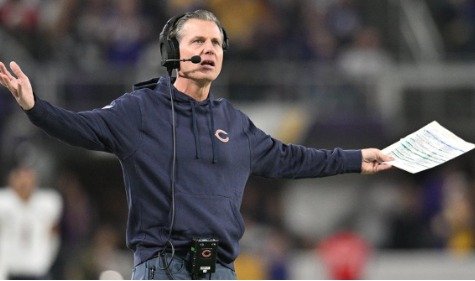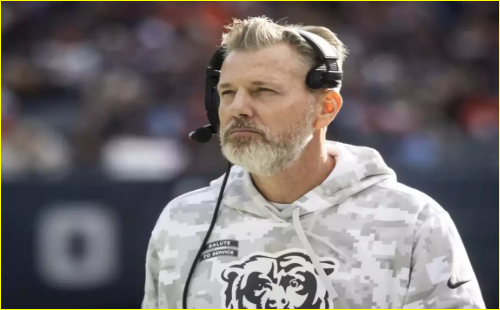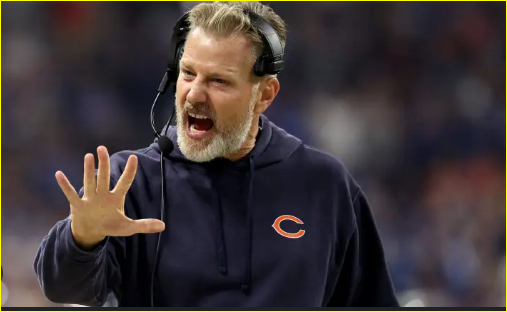Week 3 was anticipated to be the “get-right” game for the Chicago Bears offense, and in some aspects, it appeared to be just that. The Bears managed to outgain the Indianapolis Colts on offense, tallying 395 total yards compared to the Colts’ 306. Rookie quarterback Caleb Williams had a standout performance, setting a Bears franchise rookie record by throwing for 363 yards in the game.
However, despite the offensive production, Chicago still found a way to make costly mistakes that ultimately led to a frustrating loss. Whether it was turnovers, penalties, or missed opportunities, the Bears’ inability to execute in key moments overshadowed Williams’ record-breaking day. This loss will likely intensify scrutiny on the team’s ability to capitalize on offensive success and fix the recurring errors that continue to derail their efforts.
The Chicago Bears’ offensive line was once again a glaring weakness in their Week 3 loss to the Indianapolis Colts. Rookie quarterback Caleb Williams faced constant pressure throughout the game, taking hits and being forced to make quick decisions. Despite these challenges, Williams still managed to elevate the passing game, throwing for a franchise rookie record 363 yards, although one poor decision resulted in an interception.
Adding to the Bears’ struggles was questionable play-calling from offensive coordinator Shane Waldron. One of the most criticized decisions came on a crucial fourth-and-1 play near the Colts’ goal line, where Waldron called a speed option. The play backfired dramatically, leading to a significant loss and a turnover on downs. On the play, the Bears’ offensive line collapsed, with four of the five members ending up on the ground, while running back D’Andre Swift was immediately swarmed by Colts defenders.
Even though the offensive line failed to execute, the poor decision to call a speed option in such a critical moment drew the ire of players and fans alike. The combination of ineffective protection and questionable play-calling left the Bears unable to capitalize on their offensive production, further complicating their search for consistency and success this season.
#Bears center Coleman Shelton when asked about the breakdown on the fourth-and-1 play.
"Well, I mean, speed option on, you know, obviously wasn’t the greatest look to run that." pic.twitter.com/uyhtoJYrAV
— Nicholas Moreano (@NicholasMoreano) September 22, 2024
Shelton’s critique is spot on, and he’s echoing what many others were thinking after that ill-fated fourth-and-1 play call. The decision to run a speed option in such a critical moment was a head-scratcher and has only added to the growing list of questionable calls from offensive coordinator Shane Waldron this season. Despite some positives in the Bears’ offensive performance, particularly with Caleb Williams’ record-setting day, Waldron’s play-calling continues to undermine their progress.

The inconsistency in his approach seems to hinder the offense from building momentum. Simplifying the game plan and letting Williams use his natural playmaking abilities would be a smarter direction moving forward. Williams has shown he can elevate the passing game, and allowing him more freedom to make decisions could unlock even more potential for this Bears offense. The team needs to focus on consistency, reducing errors, and putting Williams in positions where he can thrive without being weighed down by overly complex or poorly timed calls.
Despite the loss, the Bears got three key playmakers involved
In Week 3, the Chicago Bears finally began to unlock the potential of some key offensive weapons, particularly tight end Cole Kmet and rookie wide receiver Rome Odunze. After fans were left in disbelief during the first two games due to Kmet’s lack of involvement, the Bears made him a focal point of the offense this week. Kmet was targeted 11 times, catching 10 passes for 97 yards and a late touchdown. Given his reliability and versatility, continuing to utilize Kmet this way is a must for the Bears moving forward.
Rookie wideout Rome Odunze also had a breakout performance, catching 6 of his 11 targets for 112 yards and his first career touchdown. Odunze’s chemistry with Caleb Williams is evident, and his ability to make plays downfield signals that he might be the Bears’ most talented wide receiver, which is saying a lot considering the presence of proven stars like D.J. Moore and Keenan Allen. Odunze looked dominant in this game and should be a primary target in the passing attack going forward.
Additionally, running back Roschon Johnson stepped up as a more physical alternative to D’Andre Swift, who has struggled to generate much between the tackles. With the offensive line continuing to have issues, Johnson’s physicality and toughness are needed to help stabilize the run game. Featuring him more could give the Bears a much-needed boost in balancing their offense and taking pressure off Williams.
Overall, the game showed promise for the Bears’ offense, but sustaining this momentum will require consistency in utilizing their top playmakers and refining the game plan.



